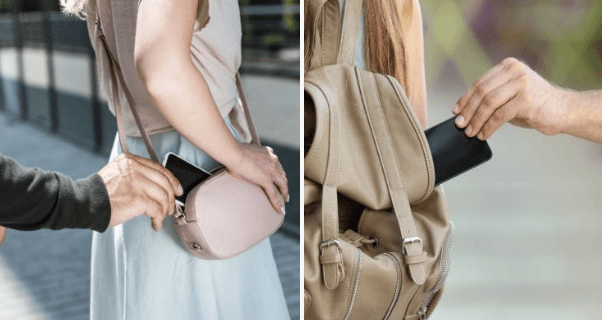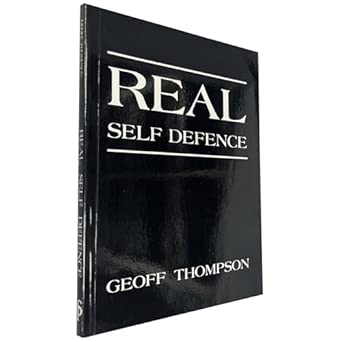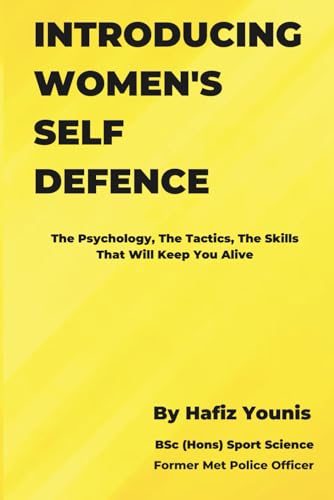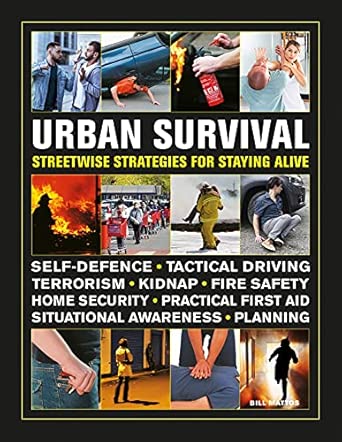
How to Avoid Getting Mugged
In a world where safety can often feel like an illusion, being proactive is more crucial than ever. With rising concerns about crime, understanding how to protect yourself from threats like muggings is essential for peace of mind and personal security.
This article unveils ten proven strategies that empower you to safeguard yourself against potential dangers.
Ranging from situational awareness techniques to practical self-defence tips, these strategies are designed to enhance your confidence and reduce your risk.
Everyone deserves to feel secure while navigating their daily lives, whether you’re strolling through a busy city street or walking home late at night.
Join us as we explore the most effective methods to help you stay safe, ensuring that you can truly embrace life with unwavering assurance and freedom.
Equip yourself with these insights, and take the first steps toward a safer, more guarded existence today.
Understanding the Risks: Why Personal Safety Matters
In today’s fast-paced world, the importance of personal safety cannot be overstated. Crime rates, particularly in urban areas, have seen fluctuations, and muggings remain a prevalent concern.
Understanding the risks associated with your surroundings is the first step towards safeguarding yourself. Muggings can occur at any time and place, often when least expected. Therefore, being aware of the potential threats and learning how to mitigate them is essential for everyone, regardless of their lifestyle or routine.
Personal safety matters not only because it protects you from physical harm but also because it maintains your mental well-being.
Living in constant fear of becoming a victim can take a significant toll on your peace of mind. By understanding the risks and taking proactive measures, you can reduce anxiety and build confidence in your ability to navigate various environments safely.
This proactive approach allows you to live your life more freely, without the looming fear of crime.
Moreover, personal safety extends beyond individual well-being; it impacts the community as a whole. When individuals are vigilant and take steps to protect themselves, it creates a safer environment for everyone.
Communities where residents are aware and prepared tend to have lower crime rates, as potential criminals are deterred by the heightened risk of being caught. Therefore, by prioritising your safety, you contribute to a safer and more secure society.
How to Avoid Getting Mugged, Awareness and Alertness: The First Line of Defence
Awareness and alertness are the cornerstones of personal safety. Being conscious of your surroundings and staying alert to potential dangers can significantly reduce your risk of being targeted by criminals.
One of the most effective ways to stay safe is to maintain a high level of situational awareness. This means continuously scanning your environment, noting any unusual behaviour, and anticipating potential threats before they escalate.
A key aspect of maintaining awareness is avoiding distractions. In today’s digital age, it is common to see people engrossed in their smartphones while walking, making them easy targets for muggers.
By keeping your head up and focusing on your surroundings, you send a clear message that you are vigilant and not an easy target.
Additionally, being aware of common mugging tactics, such as groups of people loitering in less-travelled areas, can help you make informed decisions and avoid risky situations.
Practising mindfulness can also enhance your alertness. Techniques such as deep breathing and grounding exercises can help you stay calm and focused, even in potentially stressful situations.
By staying present and fully engaged with your environment, you increase your ability to detect and respond to threats promptly.
Remember, awareness and alertness are your first line of defence against muggings, and developing these habits can greatly enhance your personal security.
Choosing Safe Routes: Planning Your Path
One of the simplest yet most effective strategies to avoid getting mugged is to choose safe routes and plan your path carefully.
Whether you are heading to work, running errands, or enjoying a night out, taking a few moments to plan your journey can make a significant difference in your safety.
Opt for well-lit, busy streets and avoid shortcuts through poorly lit or isolated areas, which are common hotspots for criminal activity.
Familiarising yourself with your surroundings is another crucial step in route planning. Knowing the layout of your neighbourhood or frequently visited areas allows you to identify safe havens, such as police stations, businesses, or public places where you can seek help if needed.
Additionally, planning alternative routes can be beneficial in case your primary path becomes unsafe. This preparedness ensures that you are never caught off guard and always have a safer option to fall back on.
Technology can also play a vital role in planning safe routes. Numerous apps and online tools provide real-time information about crime hotspots, traffic conditions, and safe paths.
Utilising these resources can help you make informed decisions and avoid areas with higher crime rates. By taking the time to plan your path and choosing safer routes, you can significantly decrease your chances of encountering dangerous situations.
The Power of Body Language: Projecting Confidence
Body language is a powerful tool in deterring potential muggers. Criminals often look for easy targets who appear vulnerable or distracted.
By projecting confidence through your body language, you can make yourself less appealing to would-be attackers.
Standing tall, making eye contact, and walking with purpose are all signals that you are aware and in control, which can make potential muggers think twice before approaching you.
Another important aspect of body language is assertiveness. If you find yourself in a potentially dangerous situation, being assertive can help deter an attacker.
Use a firm, confident voice to address any suspicious behaviour, and do not be afraid to draw attention to yourself if you feel threatened.
Shouting or making loud noises can attract the attention of bystanders and potentially scare off a mugger.
Confidence and assertiveness can significantly impact how you are perceived and can prevent a situation from escalating.
Additionally, practising confident body language can improve your mental state. When you project confidence, you are more likely to feel empowered and in control, which can reduce fear and anxiety.
This positive mindset can enhance your ability to think clearly and make quick decisions in high-pressure situations. By mastering the power of body language, you can enhance your personal safety and deter potential threats.
Smart Use of Technology: Apps and Tools for Safety
In the digital age, technology offers a plethora of tools and resources to enhance personal safety. From mobile apps to wearable devices, there are numerous options available to help you stay safe and connected.
One of the most effective ways to utilise technology for safety is by using personal safety apps. These apps offer features such as emergency alerts, location tracking, and quick access to emergency contacts, providing an added layer of security.
For instance, apps like bSafe, Noonlight, and My Safetipin allow you to share your location with trusted contacts, send SOS alerts, and even access information about safe and unsafe areas.
These features can be invaluable in emergency situations, allowing you to quickly alert loved ones and authorities if you are in danger. Additionally, many smartphones come equipped with built-in safety features, such as emergency call functions and location sharing, which can be activated with a few taps.
Wearable technology, such as smartwatches and personal safety devices, can also enhance your security. Devices like the Apple Watch or personal alarms can be used to discreetly call for help or alert nearby individuals if you are in distress.
These tools provide a convenient and accessible way to ensure your safety, especially when you are on the go. By leveraging the power of technology, you can take proactive steps to protect yourself and stay connected in case of emergencies.
Top Tip – If You Really are in a panic and there is someone defo going to attack you, get some pepper spray, a small bottle will make you feel a lot more confident.
Check Out Pepper Spray On Amazon
How to Avoid Getting Mugged – Dressing for Safety: Clothing Choices that Deter Crime
Your clothing choices can play a significant role in personal safety and crime deterrence. While fashion and style are important, it is equally crucial to consider practicality and safety when choosing what to wear.
Wearing clothing that allows for easy movement and does not restrict your mobility can be beneficial in case you need to react quickly or escape from a dangerous situation.
Opting for bright and reflective clothing can also enhance your visibility, especially at night. Criminals often target individuals who are less noticeable, as it reduces the risk of being seen or caught.
By wearing bright colours or clothing with reflective elements, you increase your visibility to others, making it harder for potential muggers to target you without drawing attention.
Additionally, avoiding flashy jewellery or expensive accessories can prevent you from attracting unwanted attention and becoming a target for theft.
Footwear is another important consideration for safety. Wearing comfortable and sturdy shoes that allow you to move quickly and confidently can make a significant difference in your ability to react to threats.
High heels or flimsy sandals can hinder your ability to run or defend yourself, making you more vulnerable.
By choosing practical and comfortable clothing and footwear, you can enhance your mobility and reduce your risk of being targeted.
Trusting Your Instincts: When to Walk Away
One of the most powerful tools for personal safety is your intuition. Trusting your instincts and listening to your gut feelings can help you avoid dangerous situations before they escalate.
If something feels off or you sense that you are in a potentially unsafe environment, it is important to trust those feelings and take action.
Walking away from a situation that makes you uncomfortable can be one of the best ways to protect yourself.
Many people ignore their instincts out of fear of overreacting or being perceived as paranoid. However, your intuition is often based on subtle cues and past experiences that your conscious mind may not immediately recognise.
By paying attention to these signals, you can make informed decisions about your safety. If you feel uneasy, do not hesitate to remove yourself from the situation, seek help, or contact authorities.
Developing a strong sense of self-awareness and self-trust can also enhance your ability to detect and respond to threats.
Practising mindfulness and regularly checking in with your feelings can help you become more attuned to your instincts. By trusting your intuition and taking proactive steps to protect yourself, you can reduce your risk of becoming a victim and enhance your overall sense of security.
Self-Defence Techniques: Basic Skills Everyone Should Know
Learning basic self-defence techniques can be a valuable asset in protecting yourself from muggings and other attacks.
While the goal is always to avoid dangerous situations, knowing how to defend yourself can provide you with the confidence and skills needed to react effectively if you are confronted by an attacker.
Self-defence classes are widely available and offer training in various techniques, from physical manoeuvres to psychological strategies.
One of the most important principles of self-defence is to use your body’s natural weapons, such as your fists, elbows, knees, and feet.
Techniques like striking vulnerable areas (e.g., eyes, nose, throat, and groin) can incapacitate an attacker and give you the opportunity to escape.
Additionally, learning how to break free from common holds and grips can be crucial in a confrontation. Practising these techniques regularly can help you react quickly and effectively in a real-life scenario.
In addition to physical techniques, self-defence training often includes strategies for de-escalation and verbal assertiveness.
Knowing how to communicate confidently and set boundaries can prevent a situation from escalating to physical violence.
Self-defence is not just about physical strength; it is about mental preparedness and the ability to stay calm under pressure.
By learning and practising self-defence techniques, you can empower yourself with the skills and confidence needed to protect yourself.
Community Resources: Local Programs and Support
Communities play a vital role in personal safety, and there are numerous local programs and resources available to support individuals in staying safe.
Many cities and towns offer community policing initiatives, neighbourhood watch programs, and safety workshops that provide valuable information and training.
Participating in these programs can help you stay informed about local crime trends and connect with others who are committed to creating a safer environment.
Local law enforcement agencies often offer resources such as self-defence classes, safety seminars, and crime prevention workshops.
These programs are designed to educate the public on effective safety strategies and provide practical skills for protecting oneself.
Additionally, many communities have support services for victims of crime, offering counselling, legal assistance, and other resources to help individuals recover and stay safe.
Building strong relationships within your community can also enhance your personal safety. Getting to know your neighbours and establishing a network of trusted contacts can provide a sense of security and mutual support.
In times of crisis, having a reliable network to turn to can make a significant difference. By engaging with community resources and fostering connections, you can contribute to a safer and more supportive environment for yourself and others.
Conclusion: Empowering Yourself Through Preparedness
Personal safety is a multifaceted issue that requires a proactive and informed approach.
By understanding the risks, staying aware and alert, planning safe routes, projecting confidence through body language, utilising technology, dressing for safety, trusting your instincts, learning self-defence techniques, and engaging with community resources, you can significantly reduce your risk of being mugged and enhance your overall sense of security.
Empowering yourself through preparedness is the key to living a confident and fearless life. While it is impossible to eliminate all risks, taking these steps can greatly improve your ability to navigate your environment safely.
Personal safety is not just about avoiding danger; it is about building the skills and mindset needed to handle potential threats effectively.
By equipping yourself with knowledge and strategies, you can take control of your safety and enjoy a greater sense of freedom and peace of mind.
Remember, everyone deserves to feel safe and secure in their daily lives. Whether you are walking through a busy city street or heading home late at night, these proven strategies can help you stay vigilant and protected.
Take the time to implement these tips and share them with others in your community. Together, we can create a safer and more secure world for everyone.
Hope You Got what you wanted from our How to Avoid Getting Mugged article. Feel free to comment below with any other ideas!











